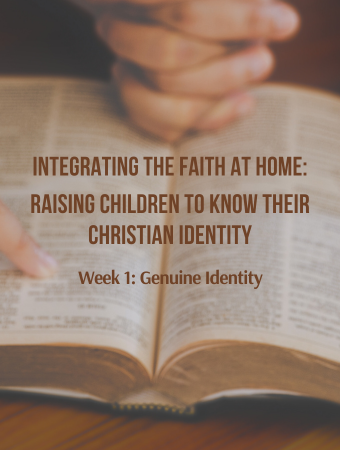
Over the next eight weeks, I’ll be leading a mid-week adult Bible class at church. I’ve titled the class, “Integrating the Faith at Home: Raising Children to Know Their Christian Identity.” It’s wordy, I know. But I hope it presents a clear objective. As Christian parents, our most important job is to raise children who have a lasting relationship with their Lord and Savior, Jesus Christ. A child’s education, accolades, career, wealth, and success are all temporal. Only salvation is eternal. At the end of the day, I want my child to intimately know his creator. I want my child to know that his genuine identity is God-given. I want my child’s life choices to be rooted in this Christian identity.
As I lead this class at church, I plan to write a corresponding post each week. I invite you to come along as I consider how to integrate the faith at home, and how, as Christians, that work is ultimately rooted in our understanding of our God-given identity.


HOW DO YOU DEFINE “IDENTITY”?
When I taught this lesson in class, most people talked about identity as though it were synonymous with vocation or related to interests. “I’m a father and a husband,” or “I’m a health care worker,” or “I’m a writer and a gardener.” We acknowledged that identity is often viewed in context of material possessions. It’s sometimes wrapped up with the kind of car you drive, the vacations you take, or the neighborhood in which you live. I believe that our past experiences also influence our perception of identity.
When I was growing up, I was in a different school every year for 3rd, 4th, 6th, 7th, 8th, and 9th grades. That’s a lot of change in a period of time where I thought extensively about my identity. Mostly, I thought about who I was in relation to other people. I felt like I was given a do-over with each move….a chance to be whoever I wanted to be in that place. Sometimes I would change my clothes or my hair in an effort to fit in. I would occasionally feign interest in something that did not really interest me. Again, I did this to change the way in which I might relate to other people. It took me a long, long time to finally understand my true identity. My past experiences left me feeling confused about who I was.
HOW DOES THE CULTURE DEFINE “IDENTITY”?
To complicate matters, our culture has a whole different perception of identity. From the culture’s perspective, identity is heavily related to material status. You only need to change your clothes and dye your hair in order to try on a new identity. Deviance from the norm is a mark of uniqueness. And while everyone wants the stamp of “unique,” there’s also a desire to relate to others, so even in deviance, people seek out community. John-Paul Sartre represents my childhood perception of identity when he says, “A man is what he wills himself to be.” Perhaps there’s even a bit of George Bernard Shaw thrown in with, “Life isn’t about finding yourself. Life is about creating yourself.”
In today’s culture, identity is subjective. There is no universal truth. Identity can be whatever you want it to be. YOU can be whatever you want to be. Your heart tells you who you are. Your heart, then, is the guide. No one can question another’s perceived identity. It is right because they self-declare it to be so. Because identity comes from within, it cannot be wrong.
HOW DOES THE BIBLE DEFINE “IDENTITY”?
I’d like to begin this section by sharing what the Bible says about the state of the human heart. Jeremiah 17:9 says, “The heart is deceitful above all things, and desperately sick; who can understand it?” In Mark 7:21-23, we read, “For from within, out of the heart of man, come evil thoughts, sexual immorality, theft, murder, adultery, coveting, wickedness, deceit, envy, slander, pride, foolishness. All these evil things come from within and they defile a person.” The Bible warns us that we should not look into our own hearts for a sense of purpose or identity. We’ll lead ourselves astray. We cannot trust the desires of our hearts. We don’t like to read such things about ourselves. Thankfully, the Bible speaks even more boldly about the work that is done for us by a forgiving and loving God who identifies himself as “Father.”

OUR IDENTITY IS GOD-GIVEN
Our eternal identity does not come from within us. We don’t create it or find it. God declares our eternal identity over us. God gives this identity to his children. I John 3:1 says, “See what kind of love the Father has given to us, that we should be called children of God; and so we are.” We find our identity by looking to our relationship with Christ. Because we are children of God, we are loved, chosen, forgiven, and redeemed.
- In Christ, we are loved:
- “But God, being rich in mercy, because of the great love with which he loved us, even when we were dead in our trespasses, made us alive together with Christ – by grace you have been saved.” Ephesians 2:4-5
- In Christ, we are chosen:
- “Blessed be the God and Father of our Lord Jesus Christ, who has blessed us in Christ with every spiritual blessing in the heavenly places, even as he chose us in him before the foundation of the world, that we should be holy and blameless before him.” Ephesians 1:3-4
- In Christ, we are forgiven:
- “If we confess our sins, he is faithful and just to forgive us our sins and to cleanse us from all unrighteousness.” 1 John 1:9
- In Christ, we are redeemed:
- “For all have sinned and fall short of the glory of God, and are justified by his grace as a gift, through the redemption that is in Christ Jesus, whom God put forth as a propitiation by his blood, to be received by faith.” Romans 3:23-25
OUR GENUINE IDENTITY IS THIS AND THAT
As Christians, our God-given, genuine identity makes no sense to the god-less world. They don’t see it or understand it. Christians are type-cast. Unbelievers misunderstand Christians. We are loved, chosen, forgiven, and redeemed. We should approach the world rooted in the truth of our identity. All of our decisions and interactions should reflect this core of our Christian identity.
While this Christian identity is eternal, there is more to us on earth. God made us to be relational people. Our identity on earth is inseparable from those around us. We are not utterly unique individuals, floating like bubbles through the known world. Our lives connect to others.
Ideally, we want our earth-side identity to be a reflection of our eternal identity. We want the people with whom we connect to see who God has declared us to be. When sin reigns over our lives, our God-given, genuine identity seems oppositional to what the world sees in us. It’s incongruent for God to declare us loved, chosen, forgiven, and redeemed, if we then approach the world with hatred, resentment, or discrimination. But when our God-declared identity is at the forefront of our attention, we can pray that God might extend such characteristics into our daily, earthly life. Our identity is both eternal and temporal.

MOVING FORWARD
As I move forward through this class, and through these posts, all sub-topics will be rooted in our shared, declared, genuine identity. This truth will inform every discussion in the future. I will post the following topics as they are completed in my mid-week class:
Integrating the Faith at Home: Raising Children to Know Their Christian Identity
First Week: Genuine Identity
Second Week: Practical, Innovative Habits
Third Week: Unusual Compassion and Grace
Fourth Week: The Value of Christian Relationships
Fifth Week: Introducing Biblical Sexuality
Sixth Week : Faith-Filled Digital Citizens
Seventh Week: Managing God’s Wealth
Eighth Week: Professional and Personal Vocation
For another post that I’ve written on Christian Identity, see Christian Identity and Personal Wellness.






Leave a Reply
You must be logged in to post a comment.